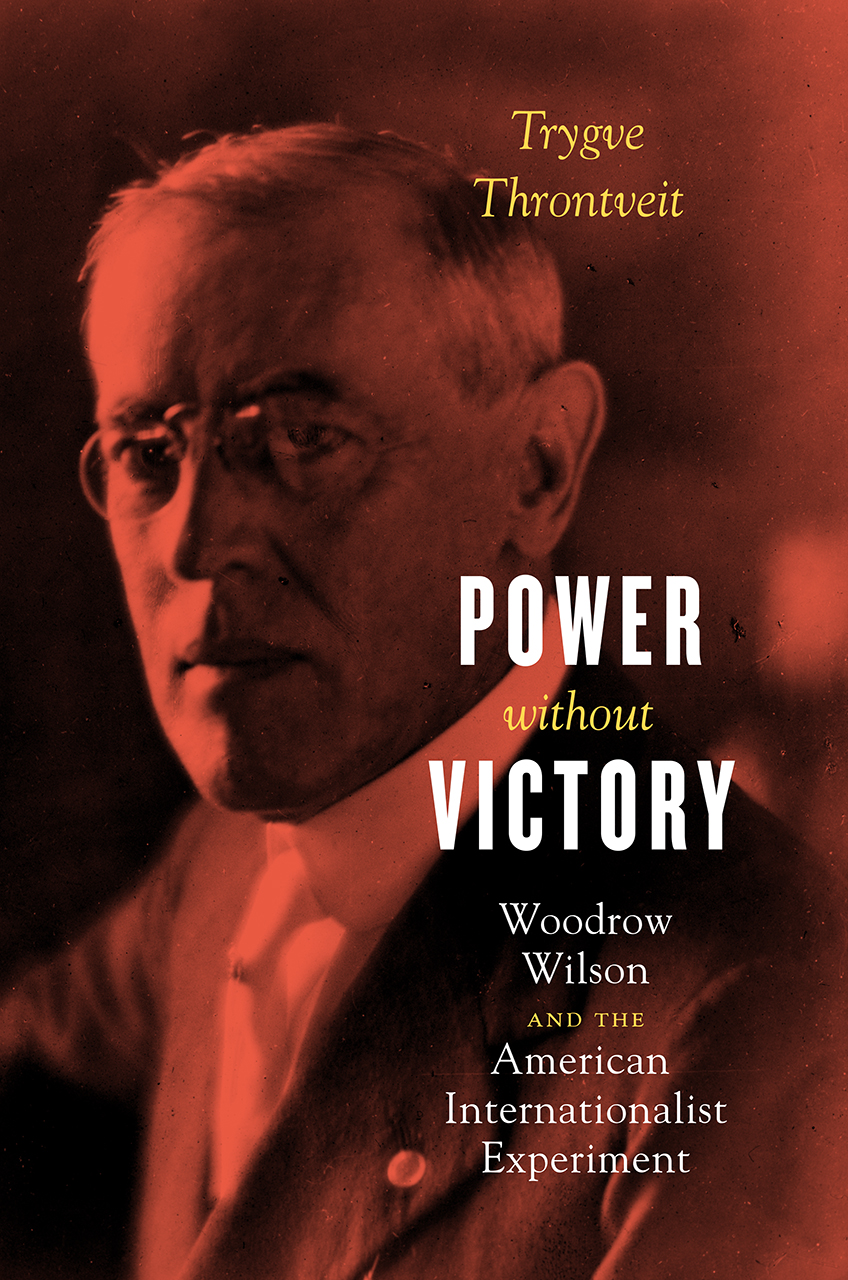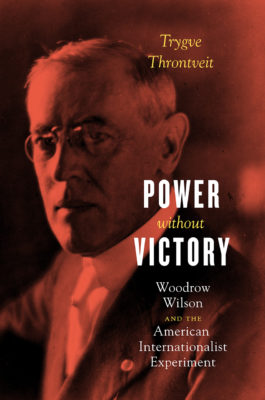Editor's Note
Robert Adcock is a Professorial Lecturer in the School of International Service at American University. His interests focus on the politics of knowledge, the transatlantic history of the social sciences and of liberalism, and the philosophy and methods of the social sciences. He is the author of Liberalism and the Emergence of American Political Science: A Transatlantic Tale (Oxford University Press, 2014) and co-editor of Modern Political Science: Anglo-American Exchanges since 1880 (Princeton University Press, 2007).

Throntveit sets out in his Power without Victory to recover “the neglected ties between Wilson’s internationalist vision and … American pragmatism” (p. 7). Such a quest demands a combination of meticulous historical labors and philosophical sophistication. This fascinating book eloquently shows that Throntveit was more than up to the task he set himself. But it also reflects something more about its author: this is a book about pragmatism written by a pragmatist aware and indeed proud of the present-day purpose he seeks to advance through his historical work. As he avows in concluding the book, Throntveit believes that his historical reconstruction of how ideals of “a more progressive democracy and constructive diplomacy … had begun to make real differences before they were abandoned should vindicate the right to believe in them” (p. 309) today.
I am not a pragmatist. Although the passion of others for pragmatism has led me multiple times to begin William James’s Pragmatism, I must confess I have never managed to make it through the work. It just does not move me philosophically. Moreover, I have read and taught widely in Wilson’s scholarly and political texts without recognizing influences of pragmatism. I thus began Throntveit’s Power without Victory as a skeptic of its quest. By the end I was, however, excited to find myself persuaded, far more than expected, that there were indeed influential ties between pragmatist intellectuals and Wilson’s internationalist vision. The book has much to offer anyone concerned to historically understand the sources and character of Wilson’s vision, regardless of how they themselves evaluate that vision (for full disclosure, I am far from believing in it).
 A first strength of Power without Victory lies in the care with which Throntveit initially unpacks his general thesis into more specific historical claims. He clarifies upfront that he is not asserting that Wilson “considered himself a ‘pragmatist’” (p. 10). Instead, he is advancing two analytically distinguishable claims: 1) pragmatist figures “laid important cultural groundwork for Wilson’s policies,” and 2) a subset of these figures “directly shaped” those policies (p. 9). As Throntveit brings on stage the extensive cast of figures that he groups together as “pragmatist progressives,” he is mostly very clear regarding which individuals he contends to have directly shaped policies. The reader is thus positioned to evaluate how well the subsequent chapters on Wilson (Chapter 2 on) substantiate claims about particular pragmatists stated in the introduction and first chapter.
A first strength of Power without Victory lies in the care with which Throntveit initially unpacks his general thesis into more specific historical claims. He clarifies upfront that he is not asserting that Wilson “considered himself a ‘pragmatist’” (p. 10). Instead, he is advancing two analytically distinguishable claims: 1) pragmatist figures “laid important cultural groundwork for Wilson’s policies,” and 2) a subset of these figures “directly shaped” those policies (p. 9). As Throntveit brings on stage the extensive cast of figures that he groups together as “pragmatist progressives,” he is mostly very clear regarding which individuals he contends to have directly shaped policies. The reader is thus positioned to evaluate how well the subsequent chapters on Wilson (Chapter 2 on) substantiate claims about particular pragmatists stated in the introduction and first chapter.
A second strength comes with Throntveit’s success in historically supporting his central claims about “crucial episodes of direct influence” (p. 10). With regard to Wilson’s domestic policy, a standout figure is Louis Brandeis (p. 74-83). Brandeis’s influence on the economic reforms of Wilson’s stunningly productive first term is a commonplace theme in Wilson scholarship. But by persuasively situating Brandeis as a pragmatist, Throntveit gives new depth to the character and content of this influence, and provides a first key substantiation of his thesis of direct pragmatist influence. The most distinctively original contribution of Power without Victory comes next as the book moves on to examine pragmatist influences with regard to foreign policy. The sources of the internationalist experiment Wilson so famously (or infamously) pursued through creation of the League of Nations have previously been obscure (to me, at least). In the domestic realm it easy enough to chart how Brandeis’s advice put policy flesh onto the bones of a general attitude to government’s role in the economy long held by Wilson (as seen in his advocacy of a middle ground between laissez-faire and socialism in Chapter XVI of his 1889 The State). But Wilson’s published scholarship provides far less foreshadowing of his future internationalist agenda.
The crowning achievement of Power without Victory is its extensively researched reconstruction of the development of Wilson’s internationalism. Throntveit first diligently digs up hints of early internationalist ideas from Wilson’s academic years—for example, in an unpublished lecture on international law (p. 101-102)—and then skillfully uses his survey of Wilson’s Latin American foreign policy (p. 107-121, 131-33) to establish that “it was the failure of his unilateral efforts to promote democracy in Latin America that first pushed Wilson to conceive, in practical terms, a whole new structure for the regulation of international society” (p. 107). But the centerpiece of Throntveit’s account is his extended documenting of the influence pragmatist figures of the New Republic—Herbert Croly, and most of all Walter Lippmann—had on Wilson. Throntveit’s claim early in the book that “the New Republic pragmatists played a formative role in the development of Wilsonian internationalism” (p. 44) is substantiated in fascinating detail across over a hundred pages of Power without Victory (see especially p. 125-259). For almost half its length, the book steadily weaves analyses of the New Republic pragmatists into its narrative of Wilson’s evolving presidency. We see their relationship to Wilson develop, from a largely critical stance, through converging views and deepening contacts, to direct rhetorical and policy influence, and on to a culmination in Lippmann joining the administration and helping formulate the fourteen points. This extended interweaving compellingly substantiates the claim that the “founding editors of the New Republic” were “major architects of Wilson’s strategy for peace after World War I” (p. 42).
The very care and persuasiveness with which Throntveit recovers the “crucial episodes of direct influence” (p. 10) involving such figures as Brandeis and Lippmann left me, however, relatively dissatisfied with his treatment of other figures in the broader cast of pragmatists that populate his narrative. The framing claim that such further figures “as Du Bois, Addams, Veblen, and Dewey laid important cultural groundwork for Wilson’s policies” (p. 9) is vaguer and harder to evaluate that claims about specific individuals directly shaping policies. Supporting claims about laying “cultural groundwork” would require more extensive treatment than these and other secondary figures in Throntveit’s cast of “pragmatist progressives” receive. But I do not see how he could have given such treatment in Power without Victory when so much of the book’s bulk is devoted so effectively to substantiating the direct policy influence of a far smaller subset of figures. My sense here is that in bringing on stage a broad array of secondary characters, many of whom get only fleeting appearances that assume readers familiar with them, Throntveit falls prey to sub-field norms in intellectual history that encourage writing about more individuals than any scholar could actually read and reflect upon in the kind of close detail that I (probably due to sub-field norms I picked up in my own training as a political theorist) take the most pleasure in.
I would thus have preferred trimming the cast of secondary “pragmatist progressives,” with each figure retained assigned a clearly stated purpose in the book, and then given enough attention to follow through on that purpose. For example, what Throntveit ends up doing with Du Bois is not documenting indirect influence on Wilson’s policies via “cultural groundwork,” but rather (and much more interestingly) using him as a focal figure through whom to acknowledge and assess Wilson’s racism (see especially, Chap. 3). Again with Addams, the book’s actual purpose seems to shift from what the p. 9 claim might lead us to expect. While assigned to the supporting cast on p. 9, later it appears that she will join Croly/Lippmann as a direct influence on Wilson when it is claimed she “helped shape Wilson’s vision for a League of Nations” (p. 35). But subsequent treatments of Wilson and Addams relative to a League (p. 167-68, see also p. 241) do not substantiate that shaping claim.
I would have loved for Throntveit to instead focus his use of Addams onto developing his telling, but all too fleeting, comments on divergences among pragmatists. When he identified the Croly / Lippmann views influencing Wilson as only one “strain of pragmatist internationalism” (p. 125), I wanted to know more about alternative strains. The discussions at several points suggest, but do not develop more fully, Addams’ potential as a focal figure with whom to identify and analyze in closer detail an alternative strain of pragmatist internationalism. Exploring this alternative could, in turn, raise the more general issue of how much pragmatism in and of itself shapes (or not) the specific content of specific internationalist visions. Indeed, if there could be divergent pragmatist internationalisms could there even be pragmatist forms of anti-internationalism? Ultimately, for all that Throntveit has persuaded me that particular pragmatist intellectuals informed the specific substance of Wilson’s internationalism vision, I wonder how much of that substance can be tied back to pragmatism as a philosophical outlook rather than other elements within the thought of Croly and Lippmann. Examining divergences among pragmatists could help us adjudicate this question. Though perhaps I am now pointing more toward a future book I hope a scholar will write to extend the conversation on pragmatism and internationalism that Throntveit’s Power without Victory so persuasively calls us to engage in.

One Thought on this Post
S-USIH Comment Policy
We ask that those who participate in the discussions generated in the Comments section do so with the same decorum as they would in any other academic setting or context. Since the USIH bloggers write under our real names, we would prefer that our commenters also identify themselves by their real name. As our primary goal is to stimulate and engage in fruitful and productive discussion, ad hominem attacks (personal or professional), unnecessary insults, and/or mean-spiritedness have no place in the USIH Blog’s Comments section. Therefore, we reserve the right to remove any comments that contain any of the above and/or are not intended to further the discussion of the topic of the post. We welcome suggestions for corrections to any of our posts. As the official blog of the Society of US Intellectual History, we hope to foster a diverse community of scholars and readers who engage with one another in discussions of US intellectual history, broadly understood.
I don’t have time for a very substantive comment but want to thank the author of this review for his lucid summary and constructive criticism of the book (which I haven’t read).
One question: is the young Lippmann generally considered a pragmatist? I know that Lippmann as a student was close to William James but I never thought of Lippmann as a pragmatist. But probably the definition of “pragmatist” is a little fuzzy?